The European Union is “throwing out” its own rulebook to enable the accession of Ukraine into the bloc, an influential policy expert in Hungary claimed.
Speaking to Brussels Signal, Gladden Pappin – the president of the state-owned Hungarian Institute of International Affairs – warned that Brussels had so far ignored its own rule-of-law principles to accelerate Ukraine’s efforts to join the EU.
He added that Ukrainian membership of the Union would also pose a myriad of other problems, especially within the European agricultural sector.
“Not only has the Ukraine accession begun by throwing out a lot of the rules, but [membership] would be – from the standpoint of the agricultural situation – devastating for European farmers,” he warned, adding that such damage would only serve to increase “political instability” and “economic chaos” within the bloc.
Pappin added that the current Ukrainian accession process also risked hurting the EU’s relationship with many countries in the Western Balkans, some of which have been trying to join the bloc for decades.
“The accession process for Ukraine was begun by throwing out all the countries of the Western Balkans that have been on their European ascension path for many, many years,” he said.
The think-tank chief warned that many in those countries have started to feel that European elites are “hesitant” to let them join the Union, something he said he feared could worsen relations and cause “some political concern”.
France must pump €5 billion into AI development a year for the next five years if it wants to be competitive at the international level, a Government report has found. https://t.co/DFaXDhIH1d
— Brussels Signal (@brusselssignal) March 14, 2024
Speaking on enlargement more generally, Pappin argued that Europe should look to accelerate the inclusion of many of these hitherto ignored Balkan nations.
That, he suggested, would likely be a top priority for the coming Hungarian presidency of the Council of the EU, arguing that both Budapest and Brussels have major incentives to see the bloc grow Eastwards.
“From an economic standpoint, the more the better-integrated this region is – Hungary borders the Western Balkan region – the stronger it will be competitively,” he said, arguing that a “smooth and speedy enlargement” of the EU was now in the bloc’s interest.
Pappin added: “The current direction of the enlargement urge is being misdirected. Hungary would like to see it go back on a path emphasising in particular the Western Balkans.”
Enlargement is just one way for the EU to increase its global competitiveness economically, with Hungary set to prioritise the issue as a “core theme” of its coming presidency.
In service of this goal, Pappin said he also believed Budapest would likely try to tackle EU overregulation, especially in sectors within which it is falling behind internationally.
He highlighted the EU’s proposed AI Act, which many have criticised as being likely to torpedo any chance the bloc has of keeping up with the US or China in terms of developing the new technology.
“We don’t have a strong role in AI companies, but we’re leading the world in AI regulation,” he said.
“This kind of mindset of the European regulatory class is becoming increasingly comical and counterproductive.
“So, the most important thing is to talk about and to articulate what the basic conditions of a competitive European economy would be … and the presidency will be one way of pursuing that.”
Hungary will also target Europe’s ongoing demographic crisis as part of this competitiveness push, Pappin added.
“An ageing society is a less competitive one,” he said, noting that as Europeans grow older, more industries will shift towards medical and home-care sectors rather than the likes of manufacturing.
Serbia’s defence minister Miloš Vučević has denied that a re-introduction of the draft will raise tensions in the Balkans. https://t.co/Ejvj9SXRMd
— Brussels Signal (@brusselssignal) January 5, 2024





